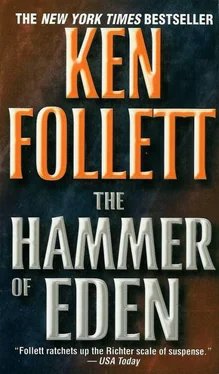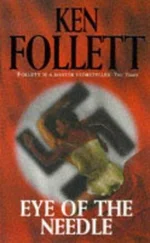She followed. Granger was darting across L Street, dodging perilously through the impatient traffic. Drivers swerved to avoid him and honked indignantly. He jumped on the hood of a yellow coupé, denting it. The driver opened the door and leaped out in a rage, then saw Judy with her gun and hastily got back in his car.
She sprinted across the street, taking the same mad risks with the traffic. She darted in front of a bus that pulled up with a screech of brakes, ran across the hood of the same yellow coupé, and forced a stretch limousine to swerve across three lanes. She was almost at the sidewalk when a motorcycle came speeding up the inside lane straight at her. She stepped back, and he missed her by an inch.
Granger sped along Eleventh Street, then dodged into an entrance. Judy flew after him. He had gone into a parking garage. She turned into the garage, going as fast as she could, and something hit her, a mighty blow in the face.
Pain exploded in her nose and forehead. She was blinded. She fell on her back, hitting the concrete with a crash. She lay still, paralyzed by shock and pain, unable even to think. A few seconds later she felt a strong hand behind her head and heard, as if from a great distance, the voice of Michael saying: “Judy, for God’s sake, are you alive?”
Her head began to clear, and her vision came back. Michael’s face swam into focus.
“Speak to me, say something!” Michael said.
She opened her mouth. “It hurts,” she mumbled.
“Thank God!” He pulled a handkerchief from the pocket of his khakis and wiped her mouth with surprising gentleness. “Your nose is bleeding.”
She sat upright. “What happened?”
“I saw you turning inside, going like greased lightning, then the next minute you were flat on the ground. I think he was waiting for you and hit you as you came around the corner. If I get my hands on him …”
Judy realized she had dropped her weapon. “My gun …”
He looked around, picked it up, and handed it to her.
“Help me up.”
He pulled her to her feet.
Her face hurt like hell, but she could see clearly and her legs felt steady. She tried to think straight.
Maybe I haven’t lost him yet .
There was an elevator, but he could not have had time to take it. He must have gone up the ramp. She knew this garage — she parked here herself when she came to see Honeymoon — and she recalled that it spanned the width of the block, with entrances on Tenth and Eleventh Streets. Maybe Granger knew that, too, and was already getting away by the Tenth Street door.
There was nothing to do but follow.
“I’m going after him,” she said.
She ran up the ramp. Michael followed. She let him. She had twice ordered him to stay back, and she could not spare the breath to tell him again.
They reached the first parking level. Judy’s head started throbbing, and her legs suddenly felt weak. She knew she could not go much farther. They started across the floor.
Suddenly a black car shot out of its parking slot straight at them.
Judy leaped sideways, fell to the ground, and rolled, frantically fast, until she was underneath a parked car.
She saw the wheels of the black car as it turned with a squeal of tires and accelerated down the ramp like a shot from a gun.
Judy stood up, searching frantically for Michael. She had heard him shout with surprise and fear. Had the car hit him?
She saw him a few yards from her, on his hands and knees, white with shock.
“Are you all right?” she said.
He got to his feet. “I’m fine, just shook up.”
Judy looked to see the make of the black car, but it had disappeared.
“Shit,” she said. “I lost him.”
As Judy was entering the officers’ club at seven P.M., Raja Khan came running out.
He stopped when he saw her. “What happened to you?”
What happened to me? I failed to prevent the earthquake, I made a wrong guess about where Melanie Quercus was hiding out, and I let Ricky Granger slip through my fingers. I blew it, and tomorrow there will be another earthquake, and more people will die, and it will be my fault .
“Ricky Granger punched me in the nose,” she said. She had a bandage across her face. The pills they had given her at the hospital in Sacramento had eased the pain, but she felt battered and dispirited. “Where are you going in such a hurry?”
“We were looking for a record album called Raining Fresh Daisies , remember?”
“Sure. We hoped it might give us a lead on the woman that called the John Truth show.”
“I’ve located a copy — and it’s right here in town. A store called Vinyl Vic’s.”
“Give that agent a gold star!” Judy felt her energy returning. This could be the lead she needed. It wasn’t much, but it filled her with hope again. Perhaps there was still a chance she could prevent another earthquake. “I’m coming with you.”
They jumped into Raja’s dirty Dodge Colt. The floor was littered with candy bar wrappers. Raja tore out of the parking lot and headed for Haight-Ashbury. “The guy who owns the store is called Vic Plumstead,” he said as he drove. “When I called a couple of days ago, he wasn’t there, and I got a part-time kid who said he didn’t think they had the record but he would ask the boss. I left a card, and Vic called me five minutes ago.”
“At last, a piece of luck!”
“The record was released in 1969 on a San Francisco label, Transcendental Tracks. It got some publicity and sold a few copies in the Bay Area, but the label never had another success and went out of business after a few months.”
Judy’s elation cooled. “That means there are no files we can search for clues to where she might be now.”
“Maybe the album itself will give us something.”
Vinyl Vic’s was a small store stuffed to bursting with old records. A few conventional sales racks in the middle of the floor had been swamped by cardboard boxes and fruit crates stacked to the ceiling. The place smelled like a dusty old library. There was one customer, a tattooed man in leather shorts, studying an early David Bowie album. At the back, a small, thin man in tight blue jeans and a tie-dyed T-shirt stood beside a cash register, sipping coffee from a mug that said “Legalize it!”
Raja introduced himself. “You must be Vic. I spoke to you on the phone a few minutes ago.”
Vic stared at them. He seemed surprised. He said: “Finally, the FBI hits my place, and it’s two Asians? What happened?”
Raja said: “I’m the token nonwhite, and she’s the token woman. Every FBI office has to have one of each, it’s a rule. All the other agents are white men with short haircuts.”
“Oh, right.” Vic looked baffled. He didn’t know whether Raja was kidding or not.
Judy said impatiently: “What about this record?”
“Here it is.” Vic turned to one side, and Judy saw he had a turntable behind the cash register. He swung the arm over the disk and lowered the stylus. A burst of manic guitar introduced a surprisingly laid-back jazz-funk track with piano chords over a complex drumbeat. Then the woman’s voice came in:
I am melting
Feel me melting
Liquefaction
Turning softer
“I think it’s quite meaningful, actually,” Vic said.
Judy thought it was crap, but she did not care. It was the voice on the John Truth tape, without question. Younger, clearer, gentler, but with that same unmistakable low, sexy tone. “Do you have the sleeve?” she said urgently.
“Sure.” He handed it to her.
It was curling at the corners, and the transparent plastic coating was peeling off the glossy paper. The front had a swirling multicolored design that induced eyestrain. The words “Raining Fresh Daisies” could just be discerned. Judy turned it over. The back was grubby, and there was a coffee ring in the top right-hand corner.
Читать дальше












